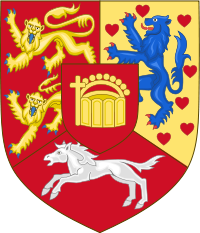
Back Huis van Hannover Afrikaans بيت هانوفر Arabic Casa de Hannover AST Гановерская дынастыя Byelorussian Хановерска династия Bulgarian Hannover (dinastija) BS Dinastia Hannover Catalan Hannoverská dynastie Czech Huset Hannover Danish Haus Hannover German
| House of Hanover | |
|---|---|
 Arms of the House of Hanover | |
 | |
| Parent family | Bonifaci → Obertenghi → Este → Welf |
| Country | |
| Etymology | Hanover |
| Founded | 1634 |
| Founder | George, Duke of Brunswick-Lüneburg |
| Current head | Ernst August, Prince of Hanover |
| Titles | List
|
| Deposition |
|
| Cadet branches | Illegitimate branches
|
The House of Hanover (German: Haus Hannover German pronunciation: [haʊ̯s haˈnoːfɐ]) is a European royal house with roots tracing back to the 17th century. Its members, known as Hanoverians, ruled Hanover, Great Britain, Ireland, and the British Empire at various times during the 17th to 20th centuries. Originating as a cadet branch of the House of Welf (also "Guelf" or "Guelph") in 1635, also known then as the House of Brunswick-Lüneburg, the Hanoverians ascended to prominence with Hanover's elevation to an Electorate in 1692. In 1714 George I, prince-elector of Hanover and a descendant of King James VI and I, assumed the throne of Great Britain and Ireland, marking the beginning of Hanoverian rule over the British Empire. At the end of this line, Queen Victoria's death in 1901, the throne of the United Kingdom passed to her eldest son Edward VII, a member of the House of Saxe-Coburg and Gotha, through his father Albert, Prince Consort. The last reigning members of the House of Hanover lost the Duchy of Brunswick in 1918 when Germany became a republic and abolished royalty and nobility.
The formal name of the house was the House of Brunswick-Lüneburg, Hanover line.[1] The senior line of Brunswick-Lüneburg, which ruled Brunswick-Wolfenbüttel, became extinct in 1884. The House of Hanover is now the only surviving branch of the House of Welf, which is the senior branch of the House of Este. The current head of the House of Hanover is Ernst August, Prince of Hanover.
- ^ "Royal Arms of Britain". Heraldica. Archived from the original on 6 December 2008. Retrieved 10 May 2016.
The House of Brunswick Luneburg being one of the most illustrious and most ancient in Europe, the Hanoverian branch having filled for more than a century one of the most distinguished thrones, its possessions being among the most considerable in Germany;